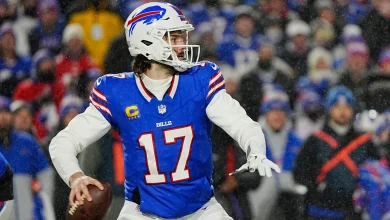In a brilliant Game 2, Yoshinobu Yamamoto showed why he was worth all the fuss

TORONTO – This is why New York Mets owner Steve Cohen flew to meet him in Japan. Why the New York Yankees put him in a suite at a swanky Manhattan hotel that previously had been used by Taylor Swift. Why the San Francisco Giants, Boston Red Sox and Philadelphia Phillies all made their own elaborate pitches as well.
Japanese right-hander Yoshinobu Yamamoto, a free agent entering his age 25 season, was worth the effort. And now that he’s simultaneously making major-league history and pointing starting pitching toward a brighter future, he appears well worth the 12-year, $325 million contract the Los Angeles Dodgers awarded him in December 2023, a record for a pitcher.
Yamamoto has thrown two straight complete games in the postseason, after a regular season in which the entire league produced only 29. His second CG — a four-hit, 105-pitch masterpiece in the Dodgers’ 5-1 victory over the Toronto Blue Jays on Saturday night, tying the World Series at one game each — was arguably more breathtaking than the first.
Against the Milwaukee Brewers in Game 2 of the National League Championship Series, Yamamoto allowed a leadoff homer by Jackson Chourio, then only two hits the rest of the way. Against the Blue Jays, a team that was averaging 6.83 runs per game in the postseason, he escaped a first-and-third, none-out jam in a 23-pitch first inning, allowed his only run on a sacrifice fly in the third and retired his final 20 hitters – the longest streak to end a World Series game since Don Larsen’s perfect game in 1956.
Yamamoto’s back-to-back complete games are the first in the postseason since Curt Schilling threw three straight for the Arizona Diamondbacks in 2001. Back then, CG didn’t stand for Completely Gone. The ’01 regular season featured 199 complete games, nearly seven times as many as there were in ’25.
Yamamoto was on such a roll Saturday night, he needed only 69 pitches to zip through his final 20 hitters, producing a franchise postseason streak longer than former Dodgers stars Sandy Koufax, Don Drysdale, Orel Hershiser and Clayton Kershaw. Oh, and Yamamoto did it while throwing six different pitches, leaning on his split-fingered fastball early, then using the rest of his arsenal to toy with the Jays late.
“I don’t really think you dare to imagine games like this,” said Dodgers vice-president of player personnel Galen Carr, who traveled multiple times to Japan before Yamamoto became a free agent to watch him pitch in person. “It’s almost too much of a stretch in some ways.
“We really believed in his ability to pitch at the major-league level and believed in his stuff. That was reflected in the contract we gave him. I wouldn’t say he’s exceeded expectations. I think he’s proven himself. If anyone else has any questions about why we gave this guy the contract that we did before pitching in the big leagues, I think he probably has answered those questions by now.”
To put it mildly, Yamamoto missed nearly two months last season with a strained right rotator cuff before returning in September and turning into a force in October. His promise was evident in the five scoreless innings he threw against San Diego in Game 5 of the Division Series and in the way he shut down the Yankees for 6 1/3 innings in Game 2 of the World Series. But actually, it wasn’t promise at all.
No, it was simply the pitcher who in Japan won three straight Sawamura Awards, the Japanese version of the Cy Young, and three straight Pacific League MVPs. The 5-foot-10, 177-pound dynamo with unorthodox training methods and freakish athletic ability that, in its own way, rivals Shohei Ohtani’s.
“You know you got the money that you got for a reason,” Dodgers right fielder Kiké Hernández said. “It’s not because you project. They didn’t give you the money because of what they think they can do to your stuff. They gave you the money because of who you are.”
This season, Yamamoto has demonstrated not only consistency but also durability, no minor feat considering his smallish frame. His start Saturday night was his 34th of the season, including the playoffs. His innings total is up to 202 1/3. And his regular-season performance, in which he finished first in the NL in opponents’ OPS and second to Pittsburgh’s Paul Skenes in ERA, could make him a finalist for the Cy Young Award.
“His throw is beautiful. I’ve said that 100 times. I just think the way he throws a baseball is perfect. No wasted movement, so efficient,” Kershaw said. “And he can do everything. He came here fastball-curveball-split basically. Now he’s throwing sinkers, cutters, sliders. He’s got six pitches with command that he uses really well.”
Yet, the way Game 2 started, it appeared Yamamoto might get worn down by the Blue Jays the same way Dodgers left-hander Blake Snell had in Game 1. A double by George Springer and single by Nathan Lukes put runners on first and third with none out in the first. And then Yamamoto fell behind the hottest hitter of the 2025 postseason, Vladimir Guerrero Jr., 2-0.
Carr recalled Yamamoto getting into similar jams in Japan, and making pitches to get out of them. Same thing happened Saturday night. Yamamoto threw four straight splits before striking out Guerrero swinging on a curveball. It was only Guerrero’s fourth strikeout in 60 plate appearances this postseason. Yamamoto then retired Alejandro Kirk on a soft liner and struck out Daulton Varsho on another curveball to somehow preserve the Dodgers’ 1-0 lead.
The Jays’ leadoff hitter also reached safely against Yamamoto in the following two innings, first on an infield popup with a 100 percent catch probability that Freddie Freeman overran, then when Yamamoto drilled George Springer on the wrist. Springer later scored after a 113.9-mph single by Guerrero on a 95-mph fastball down and in, and a sacrifice fly by Kirk. But that was the last time the Jays threatened.
“(Yamamoto) mixed six or seven pitches, or five or six, whatever it is. He showed why he is who he is,” Springer said. “You can’t try to nitpick it or do whatever. It’s one of those situations where a very, very elite guy had a great game.”
As a rookie last season, everything to Yamamoto was new. This season, he benefited from greater familiarity, and also gained a better understanding of what hitters are trying to do to him. Some of his additional knowledge came naturally, from experience. But Yamamoto also devoted more time to video study and statistical research. Dodgers pitching coach Mark Prior said the additional preparation only added to his confidence.
Yamamoto had never faced the Jays. He was pitching on 10 days rest. But he dominated a team that rocked the Yankees, the Seattle Mariners and, in Game 1, a two-time Cy Young winner in Snell.
Complete games are not quite as rare in Japan as they are in the majors. Yamamoto threw 14 in seven seasons. He trains to go nine innings. And based on his postgame comments, he didn’t think his accomplishment was that big a deal.
This is why the Mets’ Cohen hosted Yamamoto at his home in Greenwich, Conn. Why the Yankees enlisted one of the best sushi restaurants in New York to cater a meal at the hotel they arranged for Yamamoto. Why the Phillies, trying to sell him on the fervor of their market, showed him a chart detailing how the reaction of fans to a Kyle Schwarber home run in the 2022 World Series registered on the Richter scale.
All of those teams wanted Yamamoto. The Dodgers got him. And Saturday night, on the biggest stage in the sport, the pitcher showed why he was worth all the fuss, all the money.
“Outstanding, uber competitive, special,” Dodgers manager Dave Roberts said.
Or, to use an even more appropriate adjective, complete.





